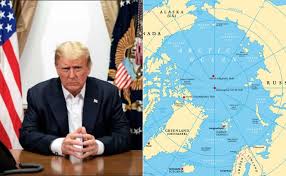Finasteriden – Former U.S. President Donald Trump’s desire to acquire Greenland has once again become a topic of controversy, stirring emotions in the Arctic. Trump’s territorial ambitions for the island, which is an autonomous territory of Denmark, have sparked outrage not only from local Greenlanders but also from international leaders. The idea of purchasing Greenland from Denmark has been met with firm opposition, with many questioning the underlying motivations behind the former president’s persistent interest.
The Origins of Trump’s Greenland Ambition
The roots of Trump’s desire for Greenland go back to 2019 when he first proposed the idea of purchasing the island. The proposal was met with sharp criticism from both Denmark and Greenland, who saw it as an infringement on their sovereignty. Despite the backlash, Trump remained fixated on the idea, believing that the acquisition of Greenland could benefit the United States economically and strategically.
Trump’s interest in the island was driven by its vast natural resources, including rare minerals, oil, and gas, which are increasingly accessible due to climate change and melting ice caps. These resources make Greenland an attractive geopolitical prize, especially in the context of the U.S.’s competition with China and Russia for global influence.
A Clash of National Interests
For Greenland, Trump’s desire to buy the island represents more than just a political issue—it touches on cultural and historical sensitivities. Greenland, home to about 56,000 people, is largely indigenous, and the notion of being sold to the U.S. without consultation with its citizens is deeply unsettling. Local leaders and politicians have strongly rejected the idea of becoming a U.S. territory, emphasizing their desire to maintain their independence and preserve Greenlandic culture.
Denmark, which governs Greenland’s foreign affairs and defense, also expressed its displeasure with Trump’s proposal, calling it “absurd” and making it clear that Greenland was not for sale. The controversy sparked heated debates within the Danish parliament and the international community, with many viewing the proposal as an attempt to assert U.S. dominance in the Arctic region.
Geopolitical and Economic Factors at Play
Trump’s interest in Greenland is closely tied to the growing strategic importance of the Arctic. As climate change melts the region’s ice, new shipping routes are opening up, and natural resources are becoming more accessible. Greenland’s geographical position makes it a valuable asset for any country seeking to enhance its presence in the Arctic and beyond.
For the U.S., controlling or exerting influence over Greenland would provide a significant military advantage. The U.S. has a large military base in Greenland, Thule Air Base, which plays a crucial role in monitoring the Arctic and maintaining defense capabilities. Trump’s vision of expanding U.S. influence in the region would likely have included increasing military and economic interests on the island.
The Global Reactions and Consequences
The idea of Trump’s purchase of Greenland has received mixed reactions globally. While some countries may view the U.S. interest in Greenland as an opportunity for economic collaboration, the overwhelming sentiment in the Arctic has been one of disapproval. Greenlanders, as well as Denmark, continue to resist the notion of selling their land and resources to the U.S.
In the larger geopolitical context, Trump’s actions have intensified tensions in the Arctic. As global powers compete for resources and control in the region, the issue of Greenland has become emblematic of broader struggles over sovereignty, climate change, and territorial disputes. The episode highlights the ongoing challenges of balancing national interests with local autonomy in a rapidly changing world.
Conclusion: A Controversial Chapter in Arctic Relations
Trump’s desire for Greenland was more than just a proposal—it ignited fierce debate over territorial rights, sovereignty, and the future of the Arctic. While his plan was ultimately rejected, the controversy surrounding the idea continues to shape international discourse on the region’s future. The episode serves as a reminder of the complex and often contentious nature of geopolitical ambitions, especially in the context of climate change and shifting global power dynamics.




